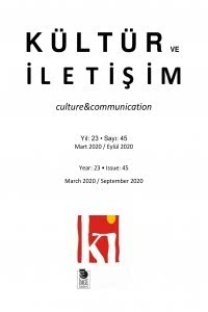Hilelik: Nuri Bilge Ceylan’ın Üç Maymun Filminde Suç ve Suçun Yeniden Üretimi
Hasan Akbulut’un isabetle altını çizdiği gibi Nuri Bilge Ceylan’ın sinemasında temel olan duygular suçluluk ve utançtır. Yönetmen, evli bir çiftin ilişkisini anlattığı İklimler (2006) filmi hariç, Kasaba (1997) , Mayıs Sıkıntısı (1999) , Uzak (2002), Üç Maymun (2008), Bir Zamanlar Anadolu’da (2011) ve Kış Uykusu (2014) filmlerinde suç ve suç işleyen karakterlerde suçla ilgili vicdani hesaplaşmayı işlemiştir. Yönetmenin filmografisinde; güçlü-güçsüz karşıtlığı temelinde başta bireylerden hayvanlara, kişisel ilişkiler çerçevesinde de bireylerden birbirlerine yönelik eylemlerde karşımıza çıkan suç, giderek toplumsal çerçeve kazanmaya başlar. Bu bağlamda Üç Maymun ve Bir Zamanlar Anadolu’da yasal anlamda suçu anlatının merkezine alırken, Kış Uykusu toplumsal düzenin adaletsizliğine vurgu yapmaktadır. Ceylan’ın yasal anlamda suç olgusunu işlediği iki filminden Üç Maymun, Bir Zamanlar Anadolu’da filminden farklı olarak, öyküsünü suç ve suçu örtbas etmek adına teklif edilen para etrafında kurmakta ve suçu örtbas etmesi adına teklif edilen paranın zincirleme biçimde suç ürettiği söylemektedir. Filmdeki suçun faili tarafından, yanında çalışan şoförü Eyüp’e suçu üstlenmesi karşılığında teklif edilen para Eyüp’ün çekirdek ailesinin temel değer ve ilişki yapısını kökten sarsacak, en önemlisi söz konusu suçu sonlandırmadığı gibi para suç üretmeye devam edecektir. Bu bağlamda, Üç Maymun filminde suç ve suça ortak olmak Hannah Arendt’in Kötülüğün Sıradanlığı metni, Eyüp, eşi ve oğlunu suçun üzerini örtmeye teşvik eden yegâne etken olarak para ve paranın temsil ettiği değerler David Greaber’in Borç ve Walter Benjamin’in Din Olarak Kapitalizm metinlerinden hareket edilerek analiz edilecektir. Filmin, karakterler arasındaki güç hiyerarşisini ortaya koyan bakış ve gözetleme düzeneğiyse Slavoj Zizek’in Yamuk Bakmak metninde sunduğu perspektif temel alınarak incelenecektir.
Anahtar Kelimeler:
Üç Maymun, suç, borç, bakış, Nuri Bilge Ceylan Sineması.
Fraud: Crime and the Reproduction of Crime in Nuri Bilge Ceylan’s Three Monkeys
As Hasan Akbulut rightly emphasizes, the fundamental affects in Nuri Bilge Ceylan’s movies are guilt and disgrace. With the exception of Climates (2006), where Ceylan depicts the relationship of a married couple, the director has focused on crime and the conscientious reckoning of his guilty characters in The Small Town (1997) , Clouds of May (1999) , Distant (2002) , Three Monkeys (2008), Once Upon A Time in Anatolia (2011) and Winter Sleep (2014). Crime, which is portrayed in the filmography of the director as directed mainly from individuals to animals and from one individual to another in personal relations within the framework of the atrocity between the powerful and the weak, gradually acquires a social dimension. In this regard, while Three Monkeys and Once Upon A Time in Anatolia center upon crime in the legal sense, Winter Sleep emphasizes the injustice of social order. As distinct from Once Upon A Time in Anatolia, the plot of Three Monkeys, one of the two films where Ceylan focuses on crime in the legal sense, is built around a crime and money offered to cover up a crime, which in turn results in subsequent crimes. The money offered by the real perpetrator to his chauffeur, Eyüp, to take the blame upon himself will shake the fundamental structure and values of Eyüp’s nuclear family and perhaps most importantly, the money will lead to further crimes, rather than covering up the crime in question. In this regard, crime and complicity in Three Monkeys will be analysed on the basis of Hannah Arendt’s Banality of Evil. Money, which is the only motivation for Eyüp, his wife and his son to cover up the crime as well as the values represented by money will be investigated within the framework of Debt by David Greaber and Capitalism as Religion by Walter Benjamin. The mechanism of gaze and surveillance which manifests the hierarchy of power among the characters will be analysed on the basis of the perspective offered by Slavoj Zizek in Looking Awry.
Keywords:
Three Monkeys, crime, debt, gaze, Nuri Bilge Ceylan Movies,
- ISSN: 1301-7241
- Yayın Aralığı: Yılda 2 Sayı
- Başlangıç: 1998
- Yayıncı: İmge Kitabevi Yayınları
Sayıdaki Diğer Makaleler
Erdem Koruyucuların Mücadele Alanı: Politik Doğruculuk Üzerine Düşünceler
İşgal, Görkem, Tehlike: Kadifekale Gençlik Altkültürünün Deneyimlerinde Kentsel Dönüşüm Anlatıları
İnan ÖZDEMİR TAŞTAN, Hatice ÇOBAN KENEŞ
Tek Parti Döneminde Politik Söz ya da Retoriğin Yeri
Medya Aktivizminin Bir Biçimi Olarak Taktiksel Medya: icmihrak.blogspot.com Üzerine Bir Analiz
Birikim Çağında Anlık Hızlandırılmış Ufuklar: Türkiye’nin Yaratıcı Cemaatleri
Hilelik: Nuri Bilge Ceylan’ın Üç Maymun Filminde Suç ve Suçun Yeniden Üretimi
Medya Sorumluluğu Düşüncesinin Yeniden icadı: Yönetimsellik Ekseninde Bir Kavrayışa Doğru
